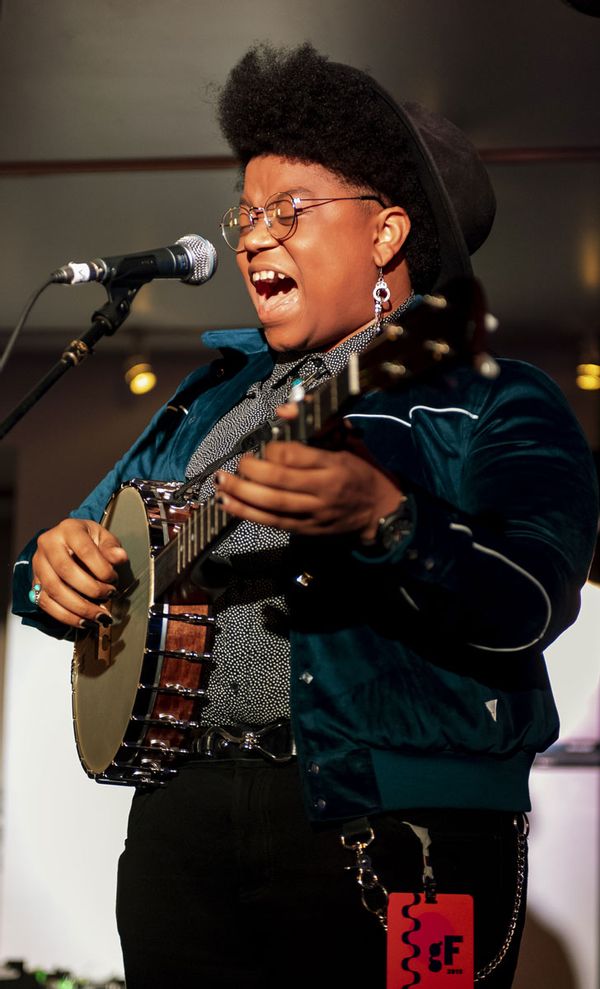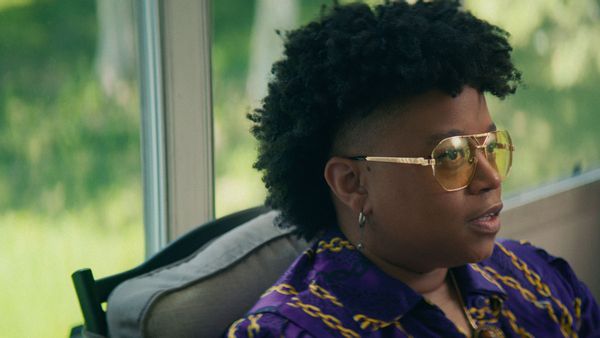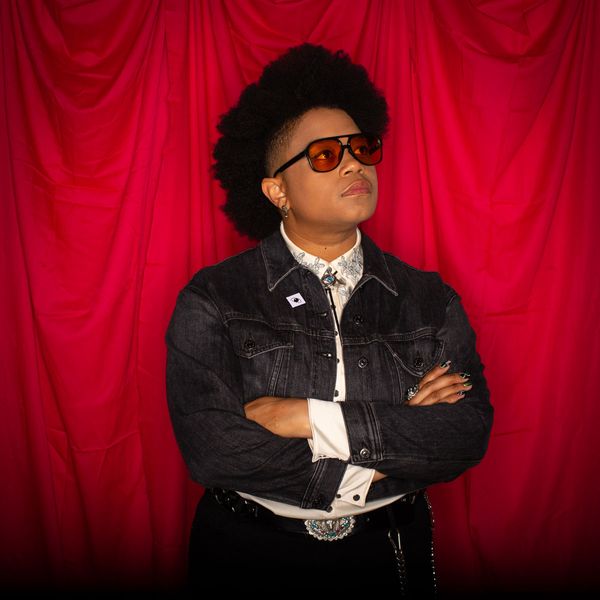
Amythyst Kiah is a powerhouse folk singer. Her raspy but commanding voice is one you cannot miss when she strums her guitar or banjo.
But alongside her growing command of the music that she has loved all her life, she is proudly a Black Appalachian native. While living in the birthplace of early roots music, Kiah found her love of country and bluegrass. The singer's life story and personal journey to becoming a successful folk musician is documented in PBS' "The Express Way with Dulé Hill."
The series invites viewers into the perspective of everyday people and how music can be a universal language and healer to all. In the second episode titled "Appalachia," the former "Psych" actor and professional tap dancer Hill travels to parts of Appalachia, namely Tennessee, to talk to people about their relationships with music and the deeper and more personal ways that it has affected their personal lives. What Hill sees in Appalachia is a community so determined to come together and uplift one another even during the most challenging moments of their lives. Alongside talking to a founder of Appalachian Stringed Instrument Co. – who helps bring in people who have struggled with addiction, as the opioid crisis hit blue-collar workers – Hill spotlights Kiah to share her experiences with addiction, loss and grief and how music helped heal her mind.
In an interview with Salon, Kiah told me that for her it was crucial to learn "the role that Black people played" in roots music but "it also just revealed another layer of 'OK, so this music has always had these cross-cultural connections.'" She described her love and motivation for music as connected. She said, "That's beautiful. I think music is a representation of how we can treat each other in real life." While sharing intimate parts of her life for the docuseries was "a bit nerve-wracking" it was a very humbling experience, Kiah felt "grateful that people are gaining something from the story."
Moreover, Kiah also clarifies that Black Appalachians exist, and even though "the depiction of Black people has usually been disparaging," "The Express Way," highlights how they are the backbone of roots music. She felt like the show's depiction of the rich history and Black Appalachians "was done with dignity and respect."
Read more of our conversation below:
The following conversation has been lightly edited for clarity and length.
What do Appalachian instruments like the banjo mean to you?
For me, learning about Appalachian music was a way for me to establish a sense of place and identity. For a really long time, specifically like in my late teen years, I developed a certain amount of social anxiety. It came from that awkwardness of grappling with my sexuality and grappling with body dysmorphia, and being around a lot of people that didn't necessarily look like me and feeling overlooked a lot of the time, just as I got older. I would say this is even more egregious than the other two faiths but we didn't go to church which is a big no-no in the predominantly, conservative Christian, suburban area that we lived in. There was just a lot of confusion as far as understanding where I fit in. A huge part of my later teen years involves just getting on the family computer and just really digging into music

Like whether or not a Black person should be able to play an excellent kind of music or a white person should do this or have an Asian person do that. We get caught up in this discourse of who's right and who's wrong and then we forget that we're fundamentally human. And while yes, and it's inevitable, that we're going to have the kind of diversity that we have so far as people's cultural upbringing, the way that they speak, the foods that they eat, all of these things.
A lot of Black Appalachian history is being brought to the light by pop culture figures like Beyoncé in "Texas Hold 'Em" which features banjo player Rhiannon Giddens. What does this feel like for you to see like playing out in real time?
It's really been fascinating to see this all to see this all unfold. I couldn't see any other Black woman being able to do this on this level. When I first heard about, "Cowboy Carter" and "Texas Hold' Em" and she was the first Black woman to have a No. 1 country hit on the Billboard 200 I was like this is the only Black woman on this planet that would have been able to do that. The fact that she reached out, that her people and herself reached out to Rhiannon, and recognized her role in helping and being a huge role in reshaping the narrative about Black country music history, which is American history as well. It's all connected, and for her to reach out to her – what it got me thinking about was that Beyoncé is obviously fully aware of her power and what she's able to bring to the table. So for her to reach out to Rhiannon, who has been literally busting her a** – she's been working herself, just through and through, to get her art out and to get the message out, which is something I've always admired about her.
To see the two of them coming together and her getting a platform to speak further on the issue that she's been campaigning now for the past 10 or 15 years, to be able to see that I think this is just a huge, very symbolic moment in just a moment in music history because it's now finally on a national, international scale.
This is now being seen. The truth is being told, and it's being seen on such a massive scale. I know that there has been some discourse around whether or not Beyoncé did enough. She's a pop artist. She is a pop veteran, one of the most acclaimed artists, in our generation. So she is doing what she wants to do, and she wants to incorporate country music, but she also wants to continue to be fluid in her genre expression. And it's what I that's what I do with my music. That's what a lot of us do with our music. A lot of us that are in Americana, do that exact thing. Every song doesn't have to sound exactly the same, have the exact same chords. It's not cookie-cutter. Regardless of whether someone is really rich or really popular, or whether they're not. If we're really going to talk about gatekeeping and how toxic it can be, which of course it can be, it has been. There are different ways to help shed light on things, and I think if we start to then police, who should be doing what, I just don't see where that's helpful.
Your song "Black Myself” garnered a Grammy nomination in 2020 for Best American Roots song. The song lyrics, “I pick up a banjo and they sneer at me/Cause I’m Black myself,” really stick out to me. Is this the constant push and pull that is at the center of what it's like to be Black in country music?
I will say that one in particular was more directly pointed at the gatekeeping in country music specifically. And the remnants of that segregation of the commercial music industry inevitably led to the remnants of that in my own personal experience. Obviously, I've been able to make a living doing this so obviously there are have been people that I've met along my journey that appreciated what I did, knew the history and never once saw me as out of my league to be interested. I would run into people that never directly challenged [that] in any way.
Usually, the way it would come about would be if I'd be at a show and, or I'd be coming to play somewhere for the first time. The most common question that was asked to me would be, how'd you get into this music? That's what you could consider a microaggression. Whether intended or not, but when I decided to respond by talking about history and nine times out of 10 people would be like, "Oh, I had no idea." Fortunately, in a lot of my situations, I've been able to really disarm people and put them in a position where they're actually rethinking some things. I'm sure there have been people that have had a problem with it. I'm sure I know those people exist, but out there. At this point in my life, they've not stood in my way. As long as they're not my way, I'm good. You can do whatever you want to do, but just stay out of my way because I live my life regardless.
Addiction is heavily present in a lot of the backstories of Appalachian people, including yours. How did sharing this intimate part of your mother and father feel?
To be honest, it was a bit nerve-wracking. Because during my album campaign, the album is full of songs that I've written over the course of five or six years, and they were all about me dealing with the unhealthy ways in which I was trying to cope with my own grief. What I wasn't anticipating was how I would feel talking about some of these things repeatedly in interviews. While I think it's important to talk about mental health and talk about addiction and how it can affect people – how it can affect literally anybody, anywhere at anytime, no matter how great your life looks that people can fall victim to it – it really took a mental toll on me.
And so I hadn't had to do that in quite some time. I've been focusing on the record and really getting into this new chapter in my life with these new songs. And being able to really enjoy writing as opposed to just always being this catharsis or trauma. It was becoming something that I realized could have so much more dimension and adds so much more to my life and to be able to write about things that I enjoy and that I think are interesting. While also still always write songs about how I'm feeling, I mean that that'll always be present, but just to be in a new chapter run in a healthier mindset. So going back to the documentary, having to talk about all that stuff again. It was very nerve-wracking to do that. From the feedback I've gotten, I'm very humbled and grateful that people are gaining something from the story and or maybe gaining a better understanding about not just even just my story, but the other two guys, their stories as well.
Music can be this universal healer. What did it heal for you?
The best way I can describe it, is it healed my mind. It helped me heal my entire relationship with myself. It played a role in that. There was a lot of other things that had to play a role too: eating well, taking my physical, mental health obviously more seriously, having a therapist for the past eight years. Actively looking to improve my quality of life. But also, trying not to get too obsessed with it and then making that the stressor, which I've unfortunately done a few times in my life. We all do it to some capacity. My relationship with myself and my sense of self-loathing, and anger anxiety. I think by really actively just being able to reshift the way that I approach my art, the way that I listen to music, it's allowed me to be the most creative that I think I've been.

I think music is a part of — it's just a part of life. I don't think it's necessarily so much different than any other any other places per se. I live in East Tennessee. A lot of times people talk about Tennessee, they'll talk about the talk about Nashville, it's all about Memphis. And obviously some, some amazing things have happened musically about those places. But when you talk about East Tennessee, it's a little off the beaten path. But I think that, musically, the music history here is just as rich as any other place. Two of the first big country stars for commercial music were the Carter family and Jimmie Rogers, and they both came to Bristol to the recording sessions that Ralph Peer record executive was hosting. Those were known as the Big Bang of country music in that area. There's a whole history museum there that I was part of the curation team called The Birthplace of Country Music Museum.
There's so many different other really fascinating cultural aspects here that are celebrated. Unfortunately, in a lot of media, back to the days of travel writers in 1800s and 1700s, the depiction of Black people has usually been disparaging and it's been showing the worst of the worst. I think if you take a camera into any rural area or area that's poverty-stricken, it's not gonna look pretty, but somehow we were special. I just think there's been a lot of underestimation so that's why I truly think it's awesome to be part of something that is really going to show the breadth of a good sampling of what Appalachia is for people and can be for people. So I feel like it was done with dignity and respect I think that all we want is just dignity and respect and to be able to share what we have to offer.
In your experience, how have Black Appalachians been forgotten, ignored population or just misrepresented?
Yeah, I think I just I think generally speaking, There are still people that think there are only white people who live in Appalachia. You know, I was talking with someone there a few months back that came that told their friends that they were coming to the festival to write about the festival. And the person was like, "Oh, no, they still lynch people down there?? What? Like that doesn't happen. So there are people that truly think that it's "Deliverance" over here, that it's the "Beverly Hillbillies" or something.

Things are things feel really good. I feel like I'm in a really, really good place in my life. I've got my fiancée, bought a house, got a house out in the county. There's a really lovely community here. Johnson City is a college town. So there's camaraderie between artists and just all different kinds of people. It's a really awesome art and music community. I mean, we've got bluegrass and country, and then we've also got punk rock and metal. There's all people and all kinds of music. There's also all these different visual artists as well. A lot of different coffee shops settled and host local art. So it's a very, very active art community.
We don't move to bigger cities because we all love where we live. I think the reason why we wanted to stick around, one of them being that we'd love to be part of continuing to grow what we have as opposed to leaving. Because when people leave, then things don't change. Not to say anything is people that do leave because everybody's got to decide what they need to do. If your life is going to be treated negatively— if you are a trans person, and you're heavily concerned about being able to get the care you need, I understand why you need to leave. You have to do what you need to do. But I think because I'm privileged and able to be in the space that I'm in and to see the diversity of community where I am, I want I'm in a position where I can take part in that
What are you listening to these days, and who do you want to recommend people to listen to?
I was just turned on to this band; apparently it's been around since 2014. There's this band called Jungle. I think maybe they're from the U.K. or something. But the music is just this incredible blend of of hip-hop and contemporary R&B and some electronic elements. It's just really, really good. Really good dance music. It's so awesome.
What's next after "The Express Way"? Do you have new music coming or? What do you want to share with people about what you've got going on?
Right now we're working on an album. I've been recording it. All the recordings are finished and now we're working on the packaging. I just did a photo shoot a couple of days ago with some really sick photos — super excited to have out in the world. So we did a bunch of basic – just been working on the promo stuff for it and the packaging for the album, and that will be coming out later in the fall. We'll announce the dates. Hopefully soon, but it will be in the fall. So that'll be coming out.
And then I started tour opening for Molly Tuttle for some shows this week. I'm going to start driving towards Texas. Then opening for Iron & Wine in the summer out west, which I'm also really excited about. So yeah, working on getting the new album out and just start releasing singles. And then on the road with two amazing artists. Things are looking pretty good.
"The Express Way with Dulé Hill" is now available to stream on PBS.com







